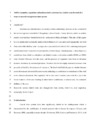Identificador persistente para citar o vincular este elemento:
https://accedacris.ulpgc.es/jspui/handle/10553/55428
| Título: | Airflow dynamics, vegetation and aeolian erosive processes in a shadow zone leeward of a resort in an arid transgressive dune system | Autores/as: | García-Romero, Leví Delgado-Fernández, Irene Hesp, Patrick A. Hernández-Calvento, Luis Viera Pérez, Manuel Hernández-Cordero, Antonio I. Cabrera-Gámez, Jorge Domínguez-Brito, Antonio C. |
Clasificación UNESCO: | 250501 Biogeografía 531290 Economía sectorial: turismo |
Palabras clave: | Aeolian shadow zone Arid transgressive dune system Wind flow Dune vegetation Topography, et al. |
Fecha de publicación: | 2019 | Proyectos: | Caracterización de Procesos Socio-Ecológicos de Los Sistemas Playa-Dunas de Canarias Como Base Para Su Gestión Sostenible Análisis de Procesos Naturales y Humanos Asociados A Los Sistemas Playa-Duna de Canarias |
Publicación seriada: | Aeolian Research | Resumen: | Structures and infrastructures can modify aeolian sedimentary dynamics as has occurred in the arid transgressive dunefield of Maspalomas (Gran Canaria, Canary Islands), where an aeolian shadow zone has been formed leeward of a tourist resort (Playa del Inglés). The aim of this paper is to analyse spatial and statistically the influences of vegetation and topography on wind flow across this shadow zone. An experiment was carried out in March 2017, collecting wind speed and direction from 5 transects with anemometers at 0.40 m height. Simultaneously, a drone flight was carried out, from which an orthophoto and digital elevation and surface models (DEM and DSM) were obtained. Distance from the resort, and the presence of vegetation were found to influence transects dominated by erosional processes. Transects that do not display erosional processes were primarily affected by the presence of vegetation. The local wind field changes at a similar distance across the transects downwind from the resorts indicating an acceleration or reattachment of the wind at this distance downwind. The vegetation role in this aeolian shadow zone could be a key to the future evolution of the area resulting in either further stabilization, or alternatively, the continued deflation of the area. | URI: | https://accedacris.ulpgc.es/handle/10553/55428 | ISSN: | 1875-9637 | DOI: | 10.1016/j.aeolia.2019.03.006 | Fuente: | Aeolian Research [ISSN 1875-9637], v. 38, p. 48-59 | URL: | https://api.elsevier.com/content/abstract/scopus_id/85063755274 |
| Colección: | Artículos |
Citas SCOPUSTM
16
actualizado el 08-jun-2025
Citas de WEB OF SCIENCETM
Citations
16
actualizado el 15-feb-2026
Visitas
69
actualizado el 10-ene-2026
Descargas
30
actualizado el 10-ene-2026
Google ScholarTM
Verifica
Altmetric
Comparte
Exporta metadatos
Los elementos en ULPGC accedaCRIS están protegidos por derechos de autor con todos los derechos reservados, a menos que se indique lo contrario.
